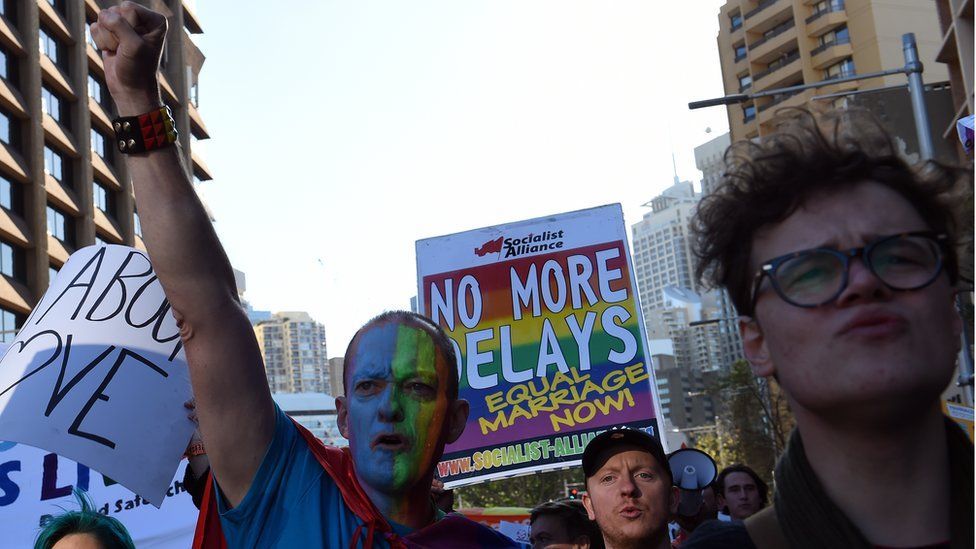Gay marriage in spotlight in Australia election
- Published

Same-sex marriage has become a front-page issue in the final days of Australia's election campaign.
The ruling conservative Liberal Party has promised to hold a plebiscite on the issue if it returns to power at this weekend's election.
But questions remain over whether the party would abide by a result in favour of same-sex marriage.
Meanwhile a video has emerged of Opposition Leader Bill Shorten praising the idea of a plebiscite.
Mr Shorten last week slammed the government's plan as a "platform for homophobia" and advocated a parliamentary vote to decide the issue.
But he told a Christian lobby forum in 2013 that he would rather let the public vote on same-sex marriage than leave the issue to MPs.
Ministers dodge questions
Prime Minister Malcolm Turnbull is tipped to hold power at the election on Saturday and is aiming to hold a public vote on same-sex marriage by the end of the year.
But the result of the vote would be non-binding and MPs would need to pass further legislation to make it law.
Two senior Australian ministers have refused to say if they would support same-sex marriage in parliament.
In an interview, Treasurer Scott Morrison refused six times to say how he would vote.
"My view is, if the plebiscite is carried nationally, then the legislation should pass," Mr Morrison told the Australian Broadcasting Corp.
"If the plebiscite is not carried, then I think that settles the matter."
The treasurer - an evangelical Christian who worships at a Pentecostal megachurch - refused to give a straight answer when challenged for "clarity" on the issue.
In a separate interview, Foreign Minister Julie Bishop echoed the treasurer's comments, refusing to be drawn on the "hypothetical" issue.
"I would take my electorate's view into account, but I would also take into account how the plebiscite played out across Australia because, for example, a referendum gets up if it is a majority of states, majority of people in the majority of states," she said.
'Attitudes have moved on'
Meanwhile the video of Mr Shorten telling church leaders in 2013 that he was "completely relaxed" about a plebiscite on same-sex marriage has undermined his attack on the government.
Mr Shorten has claimed that the plebiscite would unleash a campaign of homophobia and hate, which could be avoided through a parliamentary vote on gay marriage.
In an interview with the Australian Broadcasting Corp., he played down his previous comments.
"Community attitudes have moved on in Australia," he said.
"When you look at the experience in Ireland, over a year ago, some of arguments which emerged were really ugly and repugnant."
Prime Minister Malcolm Turnbull - who takes a progressive stance on many social issues - says he will vote in favour of the marriage bill.
As a cabinet minister, he indicated he would have voted in favour of a motion to legalise same-sex marriage last year.
The proposal was opposed by former prime minister Tony Abbott.
- Published27 June 2016
- Published28 June 2016